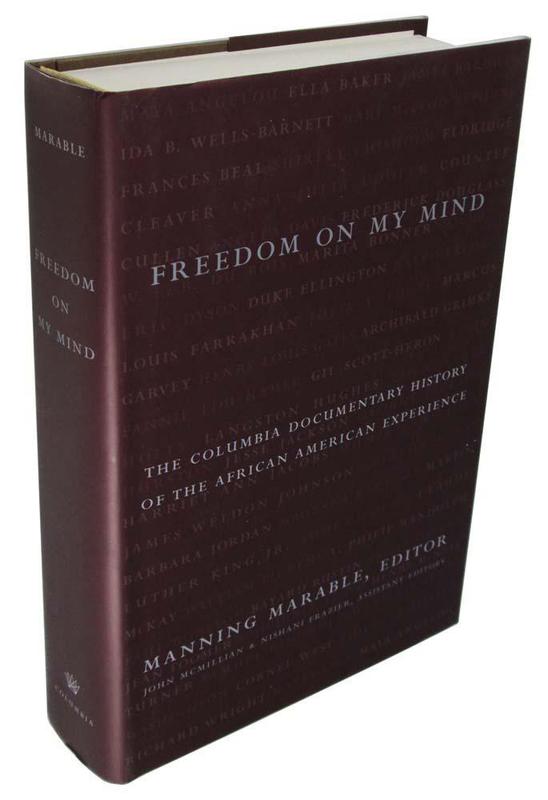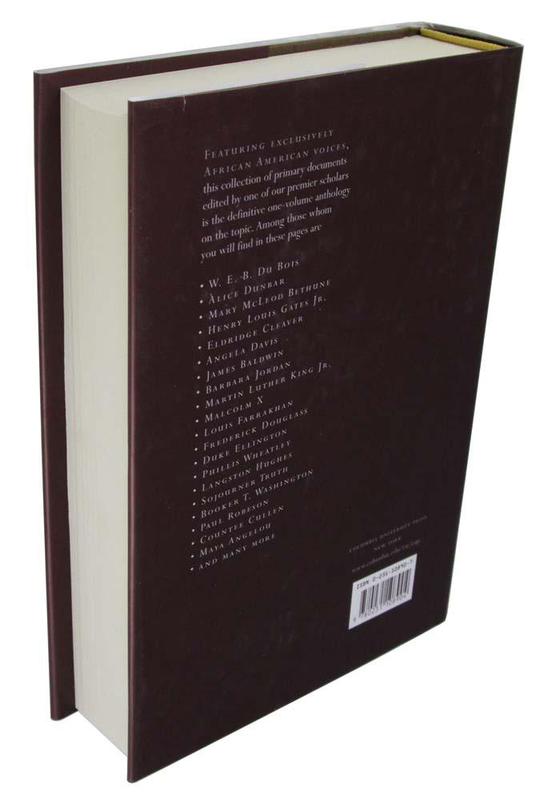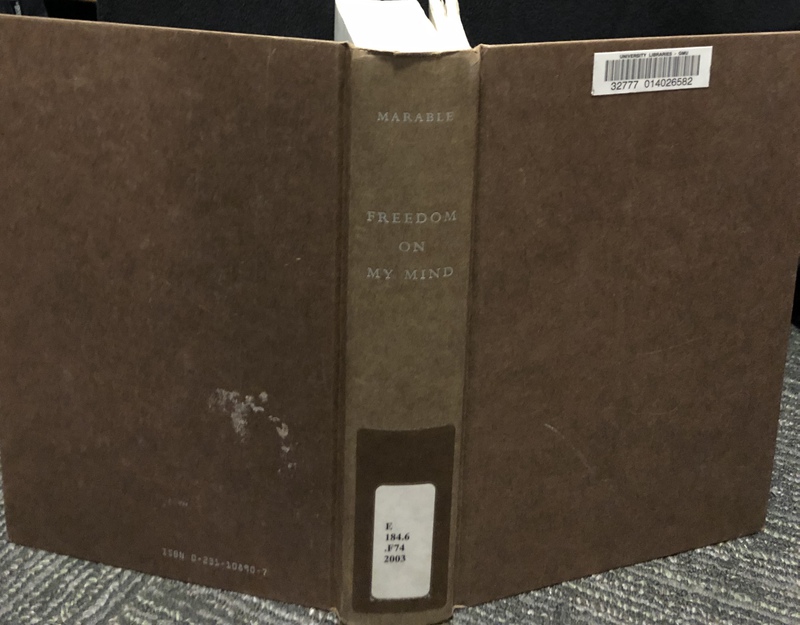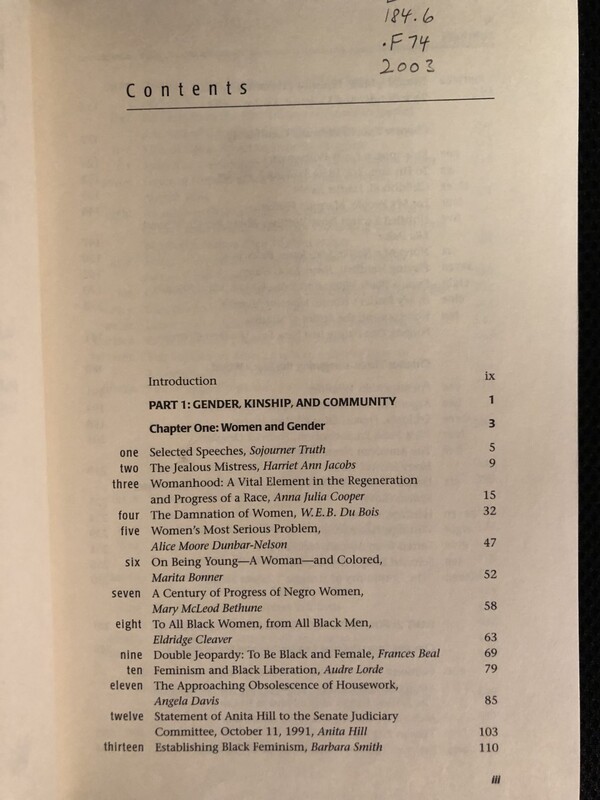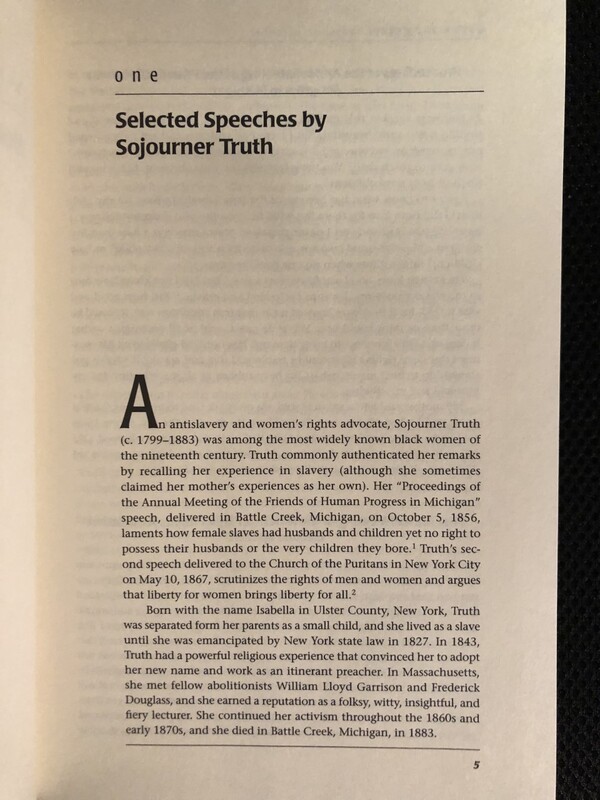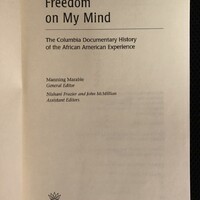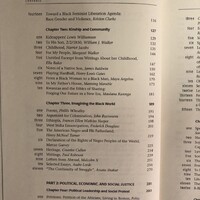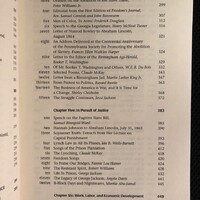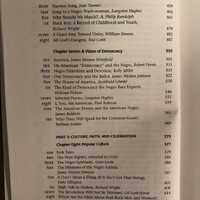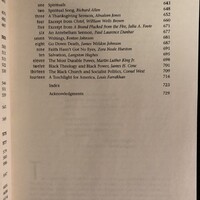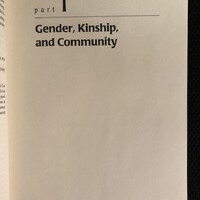Freedom on My Mind: The Columbia Documentary History of the African American Experience
Item
-
Title
-
Freedom on My Mind: The Columbia Documentary History of the African American Experience
-
This edition
-
"Freedom on My Mind: The Columbia Documentary History of the African American Experience" . Ed. Manning Marable, Nishani Frazier, and John McMillan. New York: Columbia UP, 2003. viii+734 pp.Contents in WorldCat.
-
Table of contents
-
● Introduction
Part 1: Gender, Kinship, and Community
Chapter One: Women and Gender
● Sojourner Truth / Selected Speeches
● Harriet Ann Jacobs / The Jealous Mistress
● Anna Julia Cooper / Womanhood: A Vital Element in the Regeneration and Progress of a Race
● W.E.B. DuBois / The Damnation of Women
● Alice Moore Dunbar-Nelson / Women’s Most Serious Problem
● Marita Bonner / On Being Young—A Woman—and Colored
● Mary McLead Bethune / A Century of Progress of Negro Women
● Eldridge Cleaver / To All Black Women, from All Black Men
● Frances Beal / Double Jeopardy: To Be Black and Female
● Audre Lorde / Feminism and Black Liberation
● Angela Davis / The Approaching Obsolescence of Housework
● Anita Hill / Statement of Anita Hill to the Senate Judiciary Committee, October 11, 1991
● Barbara Smith / Establishing Black Feminism
● Kristen Clarke / Toward a Black Feminist Liberation Agenda: Race Gender and Violence
Chapter Two: Kinship and Community
● Lewis Williamson / Kidnappers!
● William J. Walker / To His Son, 2/2/1850
● Harriet Jacobs / Childhood
● Margaret Walker / For My People
● Ella Baker / Untitled Excerpt from Writings About her Childhood
● James Baldwin / Notes of a Native Son
● Henry Louis Gates / Notes of a Native Son
● Maya Angelou / From A Black Woman to a Black Man
● Manning Marable / In My Father’s House
● Maulana Karenga / Kwanzaa and the Ethics of Sharing: Forging Our Future in a New Era
Chapter Three: Imagining the Black World
● Phillis Wheatley / Poems
● John Russwurm / Argument for Colonization
● Frances Ellen Watkins Harper / Ethiopia
● Frederick Douglass / West India Emancipation
● Henry McNeal Turner / The American Negro and His Fatherland
● Marcus Garvey / Declaration of the Rights of Negro Peoples of the World
● Countee Cullen / Heritage
● Paul Robeson / Writings
● Malcolm X / Letters from Abroad
● Audre Lorde / Selected Essays
● Assata Shakur / “The Community of Struggle”
Part 2: Political, Economic, and Social Justice
Chapter Four: Political Leadership and Social Protest
● Jupiter Nicholson, Jacob Nicholson, Joe Albert, and Thomas Pritchet / Petitions: Petition of the Africans, Living in Boston, Felix; Anonymous Appeal to William, Earl of Dartmouth; and The Earliest Extant Negro Petition to Congress
● Benjamin Banneker / Letter to Thomas Jefferson
● Peter Williams Jr. / Oration on the Abolition of the Slave Trade
● Rev. Samuel Cornish and John Russwurm / Editorial from the First Edition of Freedom’s Journal
● Frederick Douglass / Men of Color, To Arms!
● Henry McNeal Turner / Speech to the Georgia Legislature
● Anon. / Letter of Nimrod Rowley to Abraham Lincoln, August 1864
● Frances Ellen Watkins Harper / An Address Delivered at the Centennial Anniversary of the Pennsylvania Society for Promoting the Abolition of Slavery
● Booker T. Washington / Letter to the Editor of the Birmingham Age-Herald
● W.E.B. Du Bois / Of Mr. Booker T. Washington and Others
● Claude McKay / Selected Poems
● Martin Luther King Jr. / Letter from a Birmingham Jail
● Bayard Rustin / From Protest to Politics
● Shirley Chisholm / The Business of America is War, and It Is Time for a Change
● Jesse Jackson / The Struggle Continues
Chapter Five: In Pursuit of Justice
● Samuel Rinngold Ward / Speech on the Fugitive Slave Bill
● Hannah Johnson / Hannah Johnson to Abraham Lincoln, July 31, 1863
● Sojourner Truth / Sojourner Truth: Extracts from Her Lecture on Capital Punishment
● Ida B. Wells-Barnett / Lynch Law in All Its Phases
● Anon. / Songs of the Prison Plantation
● Claude McKay / The Lynching
● Anon. / Freedom Songs
● Fannie Lou Hamer / To Praise Our Bridges
● Robert Williams / The Resistant Spirit
● George Jackson / Life In Prison
● Angela Davis / The Legacy of George Jackson
● Mumia Abu-Jamal / B-Block Days and Nightmares
Chapter Six: Work Labor, and Economic Development
● Anon. / Work Songs
● Thomas McCants Stewart / Industrial Education for the Negro
● Jean Toomer / Harvest Song
● Langston Hughes / Song to a Negro Wash-woman
● A. Philip Rudolph / Why Should We March?
● Richard Wright / Black Boy: A Record of Childhood and Youth
● William Simons / A Giant Step Toward Unity
● Ned Cobb / All God’s Dangers
Chapter Seven: A Vision of Democracy
● James Monroe Whitfield / America
● Robert Purvis / On American “Democracy” and the Negro
● Kelly Miller / Negro Patriotism and Devotion
● James Weldon Johnson / Our Democracy and the Ballot
● Archibald Grinké / The Shame of America
● William Pickens / The Kind of Democracy the Negro Race Expects
● Langston Hughes / Selected Poems
● Paul Robeson / I, Too, Am American
● James Baldwin / The American Dream and the American Negro
● Barbara Jordan / Who Then Will Speak for the Common Good?
Part 3: Culture, Faith, and Celebration
Chapter Eight: Popular Culture
● Anon. / Folk Tales
● Anon. / The Prize Fighter, editorial in Crisis
● Alain Locke / The Negro Spirituals
● James Weldon Johnson / The Dilemma of the Negro Author
● Duke Ellington / It Don’t Mean a Thing (If It Ain’t Got That Swing)
● Richard Wright / High Tide in Harlem
● Gil Scott-Heron / The Revolution Will Not Be Televised
● Ellen Holly / Where Are The Films About Real Black Men and Women?
● Henry Louis Gates Jr. / The Signifying Monkey
● Ralph Ellison / What America Would Be Like Without Blacks
● Michael Eric Dyson / O.J. Simpson and Our Trial by Fire
Chapter Nine: Faith and Spirituality
● Anon. / Spirituals
● Richard Allen / Spiritual Song
● Absalom Jones / A Thanksgiving Sermon
● William Wells Brown / Excerpt from Clotel
● Julia A. Foote / Excerpt from A Brand Plucked from the Fire
● Paul Laurence Dunbar / An Antebellum Sermon
● Fenton Johnson / Writings
● James Weldon Johnson / Go Down Death
● Zora Neale Hurston / Faith Hasn’t Got No Eyes
● Langston Hughes / Salvation
● Martin Luther King Jr. / The Most Durable Power
● James H. Cone / Black Theology and Black Power
● Cornel West / The Black Church and Socialist Politics
● Louis Farrakhan / A Torchlight for America
● Index
● Acknowledgments
-
See also
-
This anthology is designed to function as a sourcebook of primary materials for courses on African American history and culture. See also other similar anthologies:
-
 African American Experience
African American Experience
-
● "Amistad Digital Resource." Ed. Manning Marable. Columbia University, 2009.
-
Amistad Digital Resource
-
● "Freedom on Their Minds: Professor Manning Marable launches a new Web-based teaching resource on African American history." "Columbia Magazine" (Fall 2007).
This article describes the web resource as covering "the period from 1954 to 1975 and is based on Marable's 2003 book 'Freedom on My Mind: The Columbia Documentary History of the African American Experience'."
-
Columbia Magazine
-
Item Number
-
A0373
Linked resources
Items with "See also: Freedom on My Mind: The Columbia Documentary History of the African American Experience"
| Title |
Class |
 African American Experience African American Experience |
Bibliographic Resource
|
 African American Experience
African American Experience
 African American Experience
African American Experience